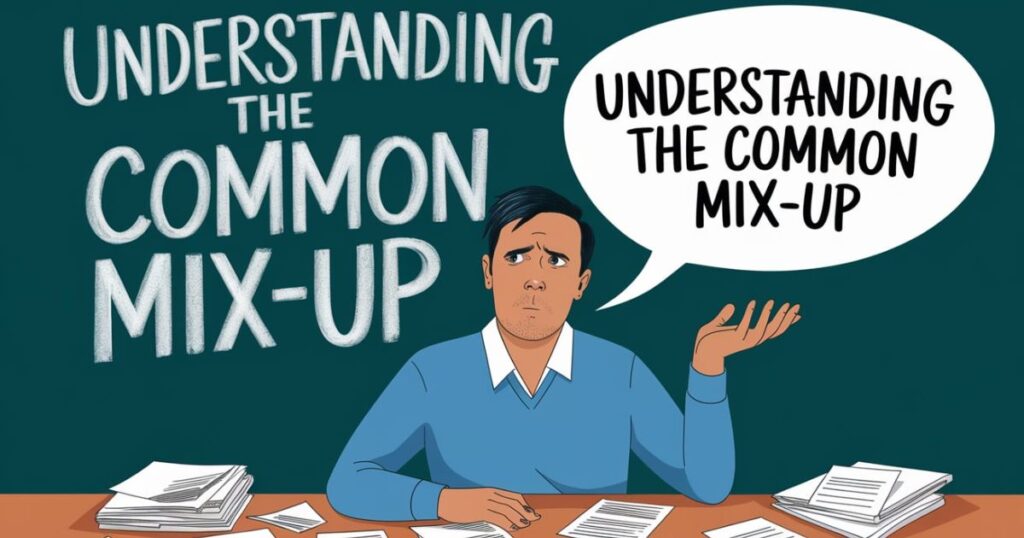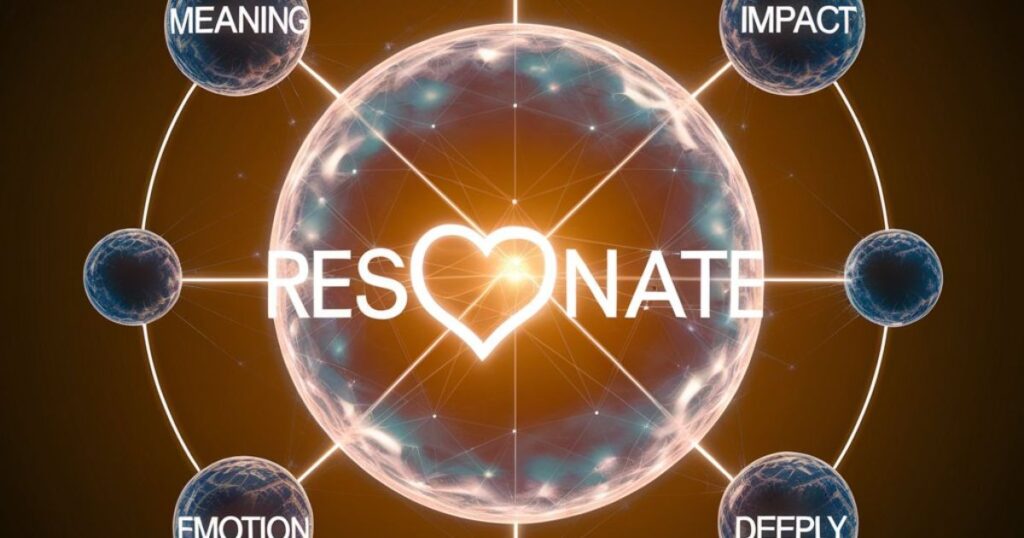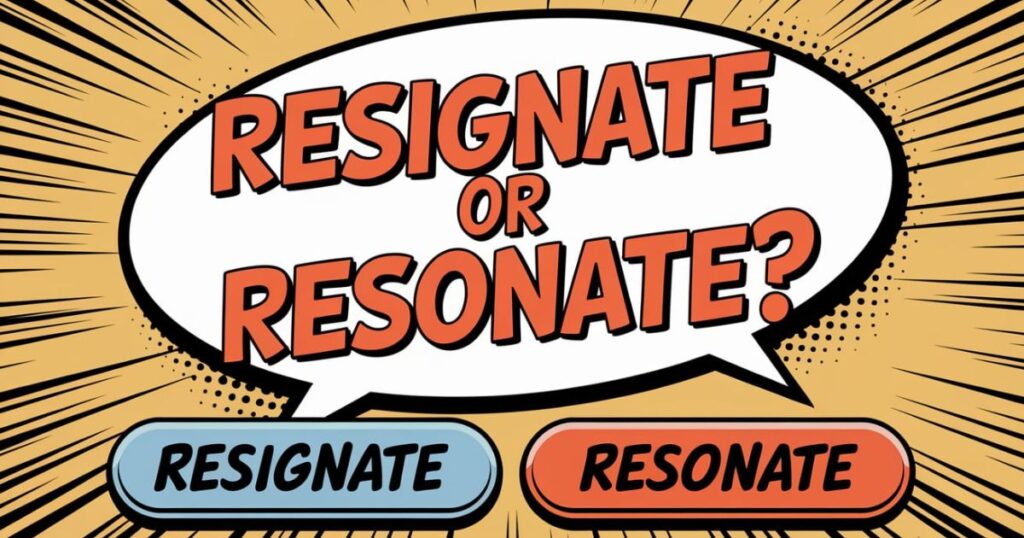Resignate or Resonate? Confused about which word to use? You’re not alone! Many people mix up resignate and resonate, but here’s the truth: one is right, and the other is a common mistake. “Resonate” is the correct choice, and it refers to something that hits you emotionally or intellectually. It’s a powerful word in literature, public speaking, and marketing, often used when something deeply connects with you.
So, when someone asks, What does resonate with you? they’re asking what really strikes a chord in your heart or mind. In the resignate vs resonate debate, resonate clearly wins. Understanding its true meaning can boost your communication skills, whether you’re speaking, writing, or sharing stories. Choose the right word for Resignate or Resonate, and watch your message come to life.
Overview
When you hear “resignate or resonate,” it’s easy to get confused. The term “resonate” is the correct word, but many people mistakenly say “resignate.” This mix-up can happen in everyday conversations, writing, or even public speaking. Understanding the difference between “resignate vs resonate” is key to improving communication.
“Resonate” has a deep meaning, referring to something that emotionally or intellectually connects with you. It’s often used in literature, motivational speeches, and marketing. On the other hand, “resignate” is simply a misspelling. So, what does “resonate with you” mean? It’s something that truly strikes a chord with you.
Understanding the Common Mix-Up

The confusion between “resignate or resonate” often arises because both words sound similar. However, “resonate” is the only correct term. “Resignate” doesn’t have an actual meaning and is simply a mistake people make while speaking or writing. So, when discussing “resignate vs resonate,” always choose “resonate” for clarity.
Knowing “resonate meaning” helps you understand its true power. It means something that echoes emotionally, leaving a lasting impression. So, next time you hear “what does resonate with you mean?” you’ll know it’s about what connects with you on a deeper level.
Why “Resignate” Is Incorrect
Imagine you’re sharing your ideas and say, “I hope this resignates with you.” While your intention is good, the incorrect word might make you seem unprepared. “Resignate” isn’t recognized as a proper term, and its use can detract from your message.
Explanation:
The term “resignate” likely comes from mixing “resign” and “resonate.” However, it doesn’t appear in dictionaries like Merriam-Webster or the Oxford English Dictionary. In the “resignate vs resonate” debate, only “resonate” is correct. To sound professional, always use “resonate.”
Examples:
Wrong: His speech resignated with the crowd.
Right: His speech resonated with the crowd.
Wrong: This painting resignates a lot with my emotions.
Right: This painting resonates a lot with my emotions.
Wrong: The story resignated with many readers worldwide.
Right: The story resonated with many readers worldwide.
Wrong: The melody resignates a sense of calm and peace.
Right: The melody resonates a sense of calm and peace.
Unveiling the Correct Spelling: Why ‘Resonate’ Is Accurate
The terms “resignate or resonate” often create confusion, but only one is correct. “Resonate” is the accurate spelling and carries a meaningful definition. It describes something that deeply connects, emotionally or intellectually. “Resignate,” on the other hand, is not a recognized word in the English language.
When comparing “resignate vs resonate,” it’s clear that “resonate” is the proper choice. The “resignate meaning” simply does not exist in formal dictionaries. But what does “resonate with you” mean? ”Resignate or resonate” refers to something that strikes a chord with you, leaving a lasting impression. Always choose “resonate” to ensure clarity and professionalism.
Read Also: Other Ways to Say Thank You for Your Thoughtfulness
Definition and Meaning of “Resonate”

“Resonate” means to create a deep emotional or intellectual impact. It is often used when something strongly connects with someone’s feelings or ideas. For example, a speech or song can resonate with an audience, leaving a lasting impression.
Literal Meaning
“Resonate” refers to creating a deep, clear, and lasting sound that vibrates through a space. It is often used to describe the way sound travels and lingers.
Scenario: Imagine tapping a glass and hearing its ringing tone fill the room. That’s how something resonates in a physical sense.
Example:
- The church bell resonated across the quiet village.
- The speaker’s voice resonated clearly in the large auditorium.
- The guitar string resonated beautifully when plucked.
- The sound of the thunder resonated through the mountains.
Figurative Meaning
Figuratively, “resonate” means creating a strong emotional or intellectual connection. It describes something that deeply impacts or aligns with someone’s thoughts or feelings.
Scenario: Think of hearing a story that perfectly reflects your own experiences. It resonates because it feels personal and meaningful.
Example:
- The motivational speech resonated with the audience, leaving them inspired.
- His story about overcoming challenges resonated deeply with me.
- The movie’s emotional ending resonated with viewers everywhere.
- Her message about kindness resonated with people of all ages.
Comparison with “Resignate”
When comparing “resignate or resonate,” it’s important to know that only “resonate” is correct. “Resignate” is a mistaken form, often confused with “resonate.” Using “resonate” ensures proper communication, as it conveys a clear and impactful meaning.
| Aspect | Resonate | Resignate |
| Definition | To create a deep sound or evoke strong emotional/intellectual connections. | Not a recognized English word, often used incorrectly instead of “resonate.” |
| Usage | Widely used in formal and informal settings for sound or emotional impact. | Incorrect and non-standard; should be avoided in all contexts. |
| Examples | “Her voice resonated with power.” | “Her voice resignated with power” is incorrect. |
| Dictionaries | Listed in Merriam-Webster, Oxford, and other trusted sources. | Not found in any reputable English dictionary. |
| Spelling Accuracy | Correct spelling; ensures clarity and professionalism in writing. | Misspelled and considered a mistake. |
| Emotional Impact | Captures and connects deeply with feelings or ideas. | Does not convey any recognized meaning or impact. |
| Context | Relevant in music, speeches, and personal connections. | Confusing and irrelevant in communication. |
| Grammatical Role | Functions as a verb in sentences, often linking ideas and emotions. | Misused attempt at a verb, leading to errors. |
| Cultural Relevance | Frequently used in literature, marketing, and public speaking. | Has no cultural or linguistic significance. |
| Professional Use | Essential for clear and effective communication in various fields. | Unprofessional; reflects a lack of linguistic knowledge. |
Lexical Insights: What Dictionaries Say
Dictionaries like Merriam Webster and Oxford confirm that “resignate” is not a valid word. They define “resonate” as creating emotional or intellectual impact or producing a lasting sound. Always rely on trusted dictionaries to understand the proper usage of words like ”resignate or resonate”.
| Dictionary | Definition of “Resonate” | Mention of “Resignate” |
| Oxford English Dictionary | To produce or be filled with a deep, reverberating sound; to evoke emotions or memories. | Does not recognize “resignate.” |
| Merriam-Webster | To produce a deep, clear, and continuing sound; to have a strong emotional effect. | Does not include “resignate.” |
| Cambridge Dictionary | To produce or be filled with a deep sound, or to have a strong emotional impact. | Does not list “resignate.” |
| Collins English Dictionary | To make a sound that lasts for a long time, or to have a significant emotional effect. | No entry for “resignate.” |
| Macmillan Dictionary | To produce a sound that continues; to have a strong emotional or intellectual effect. | Does not define or mention “resignate.” |
Etymology of “Resonate”
“Resonate” comes from Latin roots that relate to sound and echo.
Latin Root: The word comes from “resonare” meaning to “sound again” or “echo.” It reflects the idea of something being heard and reverberating through space or time.
First Recorded Usage: “Resonate” first appeared in English in the 15th century. Initially, it was used in the context of sound reverberating, particularly in physical spaces like chambers or halls.
Semantic Shift: Over time, the word evolved to also describe emotional or intellectual effects. It began representing a deeper connection that goes beyond literal sound into abstract, metaphorical meanings.
Modern Adaptation: Today, “resonate” is widely used in various fields like marketing, literature, and technology. It is used to describe how something strikes a chord emotionally or intellectually with an audience.
Scenario: Imagine hearing a song that resonates deeply, connecting with your emotions during a special moment.
Examples:
Her words resonated with the audience, inspiring them to act.
The movie’s message resonates with people across generations, sparking introspection.
The speech resonated with everyone, leaving them with lasting thoughts.
The poem’s theme resonates with those who seek personal growth.
The Psychological Impact of Errors in Communication
Perceived Credibility: When errors occur in communication, listeners may question the credibility of the speaker. Misusing words like “resignate” can damage trust and make the speaker appear unreliable.
Emotional Disconnection: Communication errors can lead to emotional disconnection. When the message isn’t conveyed clearly, it may cause frustration or confusion, hindering emotional engagement with the audience.
Cognitive Dissonance: Miscommunication creates cognitive dissonance, where listeners struggle to reconcile what they’ve heard with their understanding. This can lead to mental discomfort, affecting their focus and interpretation of the message.
Loss of Engagement: Errors ”resignate or resonate” in speech or writing can cause listeners to disengage. If a speaker continuously misuses words, it becomes hard for the audience to remain interested or pay attention.
Scenario:
Imagine giving a presentation and using incorrect terms, making your audience confused. This leads to misunderstanding and diminished impact.
Result: Misusing words like “resignate” confuses the audience, causing frustration and reducing the speaker’s credibility and message impact.
Correct Version: Using “resonate” clearly conveys the intended emotional connection, enhancing credibility and ensuring the message effectively resonates with the audience.
Solution: To improve communication, carefully check word usage, be clear and concise, and practice speaking to avoid errors that can undermine your message and audience connection.
The Evolution of “Resonate” in Modern Communication

The word “resonate” has evolved significantly in modern communication. Initially tied to sound, it now reflects emotional and intellectual connections. Today, “resonate” is a powerful tool used across various fields.
Beyond its Origins:
“Resonate” has evolved from describing physical sound to symbolizing emotional and intellectual connections. It’s now used in various fields like marketing, personal communication, and media.
In Marketing:Brands use “resonate” to describe how their message connects emotionally with customers.
In Public Speaking:Speakers aim for their words to resonate with the audience’s experiences and emotions.
In Literature:Writers use “resonate” to show how themes and characters evoke strong feelings in readers.
In Media:Television and film use resonance to capture deep emotional responses from viewers.
Scenario:
Imagine giving a presentation. You hope your message resonates with your audience, leaving a lasting impact. This makes them feel connected to your words.
Why It Works:“Resonate” works because it taps into universal emotional experiences, creating a strong, lasting bond with listeners.
Unique Figurative Usages of “Resonate”
“Resonate” isn’t just about sound. It can symbolize deep emotional or intellectual connections. Its figurative uses allow it to describe how ideas, experiences, or emotions strike a chord with others.
Metaphoric Resonance:
“Resonate” can be used beyond sound, symbolizing how ideas or emotions echo in the mind, stirring deep connections. It taps into how thoughts or feelings reverberate in people’s hearts and minds.
Examples:
His words resonated with everyone facing similar challenges in life.
Explanation: The speaker’s message deeply connected emotionally with listeners who experienced adversity in their lives.
The novel’s themes resonated with readers, sparking reflections on personal growth.
Explanation: The themes in the book triggered personal thoughts, encouraging introspection and self-awareness among readers.
The company’s brand message resonated with customers seeking authenticity and trust.
Explanation: The brand’s values aligned with customers’ desires for genuine, trustworthy companies in today’s market.
Scenario:
A motivational speaker’s words resonate with the audience, creating a powerful, lasting emotional connection during the speech.
Impact:The impact is profound as it creates a shared emotional understanding, inspiring lasting change and action.
Advanced Etymological Insights on “Resonate”

The word “resonate” carries a rich history that extends beyond its common usage. Understanding its origins can deepen our appreciation of its meaning. Let’s explore the etymology and cultural significance of ”resignate or resonate” to better grasp its evolution.
Root Breakdown:
Origin: Derived from “resonare” (re = again + sonare = to sound).
First Use: Entered the English language in the 15th century, originally referring to physical sound reverberations.
Semantic Shift: Over time, the word expanded to represent emotional or intellectual reverberations, not just literal sound.
Metaphorical Meaning: Refers to ideas or emotions that echo or linger in the mind.
Modern Usage: Used to describe profound connections, both literal and figurative, in contemporary language.
Cultural Influence:
“Resonate” is frequently used to describe emotional connections with sound or music.
Authors use it to convey deep emotional or intellectual impacts on readers.
Refers to messages or content that evoke strong, meaningful reactions in audiences.
“Resonate” describes messages that connect with the audience on a personal level.
Represents shared emotions or experiences that leave lasting impressions on individuals.
Creative Scenarios for “Resonate”
“Resonate” adds depth to creative scenarios, making messages memorable and impactful. From storytelling to music, it captures emotional and intellectual connections. Let’s explore how ”resignate or resonate” brings creativity to life.
Scenario 1: A Wedding Speech
When delivering a wedding speech, the word “resonate” can help evoke emotions.
Incorrect: The couple’s love resignated with everyone in the room.
Correct: The couple’s love resonated with everyone in the room.
Incorrect: His words resignated deeply with the guests.
Correct: His words resonated deeply with the guests.
Incorrect: The heartfelt vows resignated throughout the ceremony.
Correct: The heartfelt vows resonated throughout the ceremony.
Impact: The right use of “resonate” makes the speech more emotional and memorable.
Scenario 2: Customer Feedback in Marketing
Using “resonate” correctly can strengthen your brand’s connection with customers.
Incorrect: The new ad campaign resignated well with the audience.
Correct: The new ad campaign resonated well with the audience.
Incorrect: This promotion resignates with our target demographic.
Correct: This promotion resonates with our target demographic.
Incorrect: The product message resignated with many customers.
Correct: The product message resonated with many customers.
Impact: Correctly using “resonate” enhances brand messaging and customer engagement.
Practical Exercises
To effectively learn how to use “resonate,” practice with these exercises:
- Identify the Error: Rewrite the sentences below correctly:
Incorrect: Her words resignated with the group.
Incorrect: The melody resignates in my mind. - Answers:
Corrected: Her words resonated with the group.
Corrected: The melody resonates in my mind. - Fill-in-the-Blank Exercise:
The motivational talk with the audience. (resignated/resonated)
The vibrations through the walls. (resignated/resonated) - Answers:
Resonated
Resonated - Create Sentences: Write your own sentences using “resonate” correctly:
The teacher’s advice resonated with her students.
The sound of the bell resonated through the quiet hallway.
His artwork resonates deeply with those who value creativity.
Practical Usage of ‘Resonate’ in Everyday Language
“Practical Usage of ‘Resonate’ in Everyday Language” highlights how this word connects deeply with emotions and ideas. It’s commonly used in conversations, writing, and speeches. Mastering ”resignate or resonate” enhances impactful communication.
Common Scenarios for Using “Resonate”
Scenario: Whether in conversations, speeches, or writing, “resonate” is often used to describe deep emotional or intellectual connections. It conveys impact and relatability in various contexts.
Examples:
A motivational quote resonated during a tough time, bringing hope.
A heartfelt song resonated with the audience, evoking strong emotions.
A teacher’s inspiring story resonated, encouraging students to strive harder.
A movie’s powerful message resonated, sparking conversations on social issues.
Tips for Correct Usage
Use “resonate” to describe emotional or intellectual connections, not physical objects.
Avoid using “resignate” as it is not a valid word.
Ensure “resonate” fits the context of impact, relatability, or sound.
Proofread carefully to avoid confusing “resonate” with similar-sounding incorrect terms.
Real-World Examples in Media and Literature
Scenario: Stories and speeches in media and literature often resonate deeply, leaving a lasting impression. These examples show how powerful messages connect emotionally and intellectually with audiences worldwide.
Examples:
Martin Luther King Jr.’s speech resonated with millions, inspiring change.
A heartfelt novel resonated with readers, evoking empathy and reflection.
A motivational podcast resonated, encouraging listeners to pursue their dreams.
Crafting Messages That ‘Resignate’
“Crafting Messages That ‘Resignate’” focuses on avoiding common language errors. It highlights the importance of choosing the right words to ensure clarity and impact. Learn how”resignate or resonate” effectively with your audience.
Guidelines for Impactful Communication
Scenario: Imagine speaking in front of an audience. Your message must be clear and engaging to create a lasting impact. Proper communication techniques will ensure your words resonate with others.
Examples:
Use simple language to ensure your message is easily understood by everyone in the room.
Maintain eye contact to build trust and strengthen your connection with the audience.
Speak with passion and clarity, letting your emotions resonate with the listeners.
Encourage feedback and interaction to keep the audience engaged and make the conversation meaningful.
Exercises for Mastering ‘Resonate’ Usage
Practice using “resonate” in different emotional and intellectual contexts daily.
Read literature aloud, focusing on sentences where “resonate” fits.
Create personal examples where “resonate” describes deep emotional connections.
Use “resonate” in speeches or presentations to enhance your delivery.
Write short stories incorporating “resonate” to master its emotional impact.
FAQ’S
What is the difference between Resignate and Resonate?
The correct term is “resonate.” “Resignate” is a common misspelling. “Resonate” means something that emotionally or intellectually connects, while “resignate” is not a valid word.
Why is Resonate the correct word?
“Resonate” is the proper term used to describe emotional or intellectual impact. “Resignate or resonate” confusion arises from people mixing it up with “resign,” but “resonate” is always the right choice.
Can I use Resignate in my writing?
No, “resignate” is incorrect. Always use “resonate” to avoid confusion. When in doubt, double-check and ensure you’re using the right word, “resonate.”
What does it mean when something resonates with you?
When something resonates with you, it deeply connects emotionally or intellectually. It leaves a lasting impact, unlike “resignate or resonate,” where “resonate” is the accurate choice.
How can I avoid confusing Resignate and Resonate?
To avoid confusion, remember that “resonate” is the correct term for emotional or intellectual connections. Always proofread your work to ensure you’re using “resonate” instead of “resignate.”
Conclusion
The confusion between “resignate or resonate” is common, but understanding the correct usage can make a big difference. “Resignate” is a mistake, while “resonate” is the proper term to use. When discussing “resignate vs resonate,” remember that “resonate” refers to something that creates an emotional or intellectual impact. If you’re wondering, “what does resonate with you mean?” it refers to something that deeply connects with you.
To communicate effectively, avoid using “resignate or resonate” incorrectly. By choosing “resonate,” you ensure your words make the right impression. Whether in writing or speech, understanding “resignate or resonate” helps convey the right message. So, always opt for “resonate” when expressing how something emotionally or intellectually strikes a chord with others.






